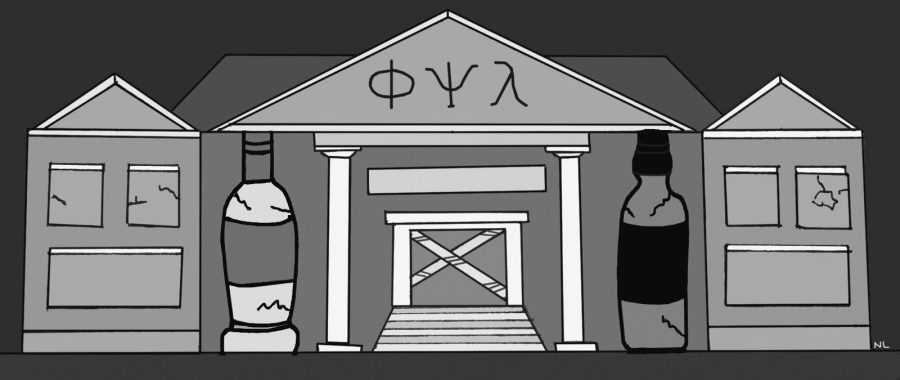Like peanut butter and jelly or ketchup and mustard, alcohol and fraternities have always been a pair that seem to go together.
Recently, a series of deaths related to fraternity hazing have sparked a call for reform.
Though disheartening, because many lives were lost to bring attention to this issue, American fraternities are working to change. The issue is that they are going about it in the wrong direction.
Fraternities across the U.S. will no longer be able to serve hard alcohol at parties.
Story continues below advertisement
In an effort to reduce hazing, over 80 percent of fraternities nationwide will no longer be able to serve hard alcohol at parties. Disguised as a solution, the hard alcohol ban provides a thinly veiled distraction while “pledging” flies under the radar as the true culprit.
The North American Interfraternity Conference came to conclusion of banning hard alcohol after a near unanimous vote on Aug. 26.
Starting on Sept. 1, 2019, students in more than 6,000 chapters across the U.S. will no longer be able to consume hard alcohol, unless it is provided by a licensed third party. This includes students over the age of 21.
Hard alcohol is defined as anything containing above a 15 percent alcohol content. Additionally, all chapter parties and events must be registered with school administration.
The prohibition of liquor was prompted by a long string of hazing-related deaths as well as alcohol-influenced sexual assaults. Hank Nuwer, an author, speaker and journalism professor at Franklin College, reports there is at least one hazing-related death each year in the U.S., according to years worth of compiled data from schools across the country. There is no good reason why anyone should be subject to dying in college in such circumstances of peer pressure, especially for an issue that can be addressed.
After hazing death incidents dating as far back as 1838, this is the first significant attempt at prevention. Decision-making skills on behalf of fraternity members should be improved with or without alcohol.
It should be kept in mind that the banning of liquor is not an end all solution. Many college students express skepticism around fraternity members obeying these rules.
A Stanford University freshman who asked to remain anonymous said he would find it surprising if fraternities took the ban seriously.
Especially with older chapters, culture and traditions are highly valued and hard to break. Hazing is a prominent part of tradition, and therefore an act few will be willing to omit easily.
In addition, there is no foolproof way to keep undergraduates away from liquor. People will always find ways around rules, especially teenagers and young adults. Students can still drink in dorms before going out, hold off-campus parties and conceal alcohol from administrators.
In order to properly address the issues at hand, stricter rules against hazing should be implemented by the North American Interfraternity Conference, starting by discussing a major reform.
“Hazing” is a common term used to describe the rituals and initiation tasks many fraternities require new pledges, students applying to their selected chapter, to complete in order to prove allegiance.
For example, George Desdunes, a 19-year-old from the Sigma Alpha Epsilon fraternity at Cornell University, died from acute alcohol poisoning in 2011. As part of a tradition, he and another fraternity member were forced to drink shots of vodka each time they answered a question about their fraternity’s history incorrectly.
Desdunes is only one of over 200 lives lost since 1838 from fraternity rituals. At least 40 deaths have occured between 2007 and 2017 alone.
Most hazing happens during rush week, a time where freshmen select a fraternity or sorority to be a part of. These prospective members are referred to as pledges. To gain the status of an official member, they often have to endure a grueling selection process.
Seeing as hazing has harmful effects, includingbut not limited to alcohol-related deaths, ending the practice of “pledging” may be the answer they need to consider.
Student’s acceptance into a chapter should not be determined by their lack of self-respect or alcohol tolerance. Pledging is an unnecessary, dangerous form of initiation that university greek life should consider abolishing.
Pledging is an unnecessary, dangerous form of initiation that university greek life should consider abolishing.
The human body can become comatose from any type of alcohol in large quantities. What needs to change is not the kind of alcohol, but the kind of behavior. Schools should not endorse nor tolerate hazing
The Interfraternity Conference’s hard alcohol ban should be seen as nothing but a start. A simple forbidence of hard alcohol will not suffice in saving lives.
Only when behavior, practices and traditions are altered will greek life students be safe.

